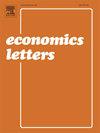序贯说服中的信息质量
IF 2.1
4区 经济学
Q2 ECONOMICS
引用次数: 0
摘要
在多发送者顺序披露信息的贝叶斯说服中,新发送者的进入降低信息质量的条件仍然不明确。本文表明,当且仅当现任发送者对完全披露表现出足够强烈的厌恶时,信息减少条目才会发生。本文章由计算机程序翻译,如有差异,请以英文原文为准。
Information quality in sequential persuasion
In Bayesian persuasion with multiple senders disclosing information sequentially, the conditions under which the entry of new senders can reduce information quality remain ambiguous. This paper shows that informativeness-reducing entry can occur if and only if the incumbent sender exhibits a sufficiently strong aversion to full disclosure.
求助全文
通过发布文献求助,成功后即可免费获取论文全文。
去求助
来源期刊

Economics Letters
ECONOMICS-
CiteScore
3.20
自引率
5.00%
发文量
348
审稿时长
30 days
期刊介绍:
Many economists today are concerned by the proliferation of journals and the concomitant labyrinth of research to be conquered in order to reach the specific information they require. To combat this tendency, Economics Letters has been conceived and designed outside the realm of the traditional economics journal. As a Letters Journal, it consists of concise communications (letters) that provide a means of rapid and efficient dissemination of new results, models and methods in all fields of economic research.
 求助内容:
求助内容: 应助结果提醒方式:
应助结果提醒方式:


